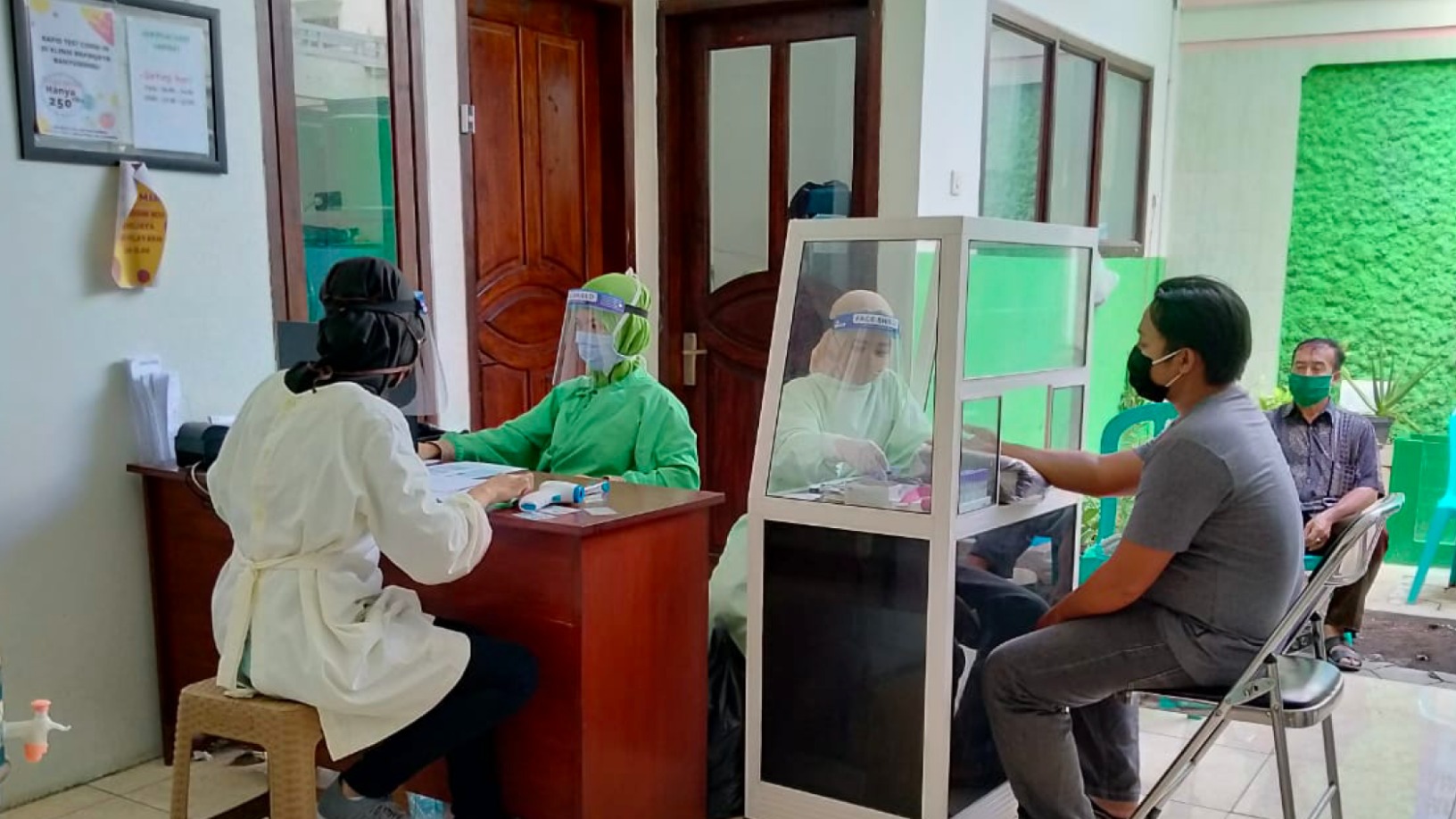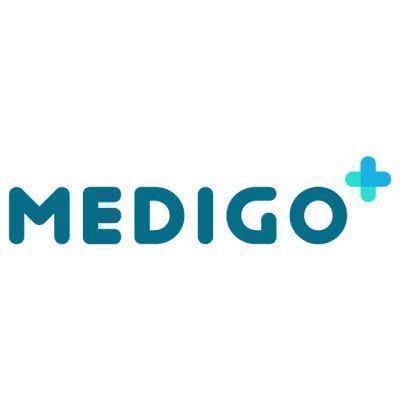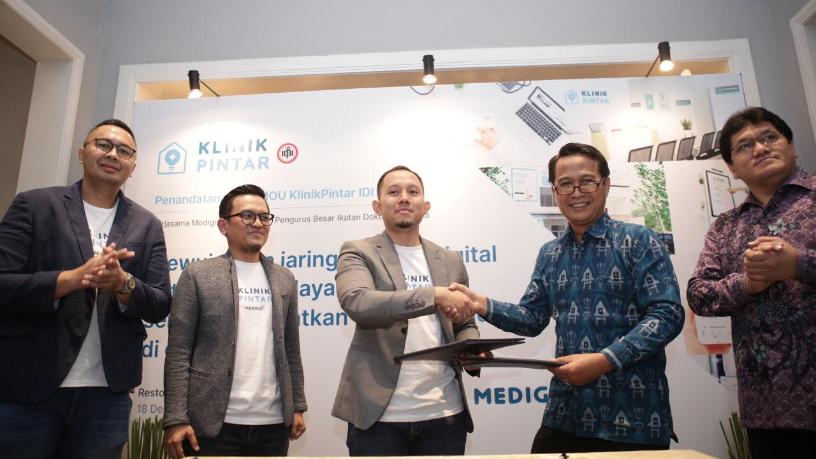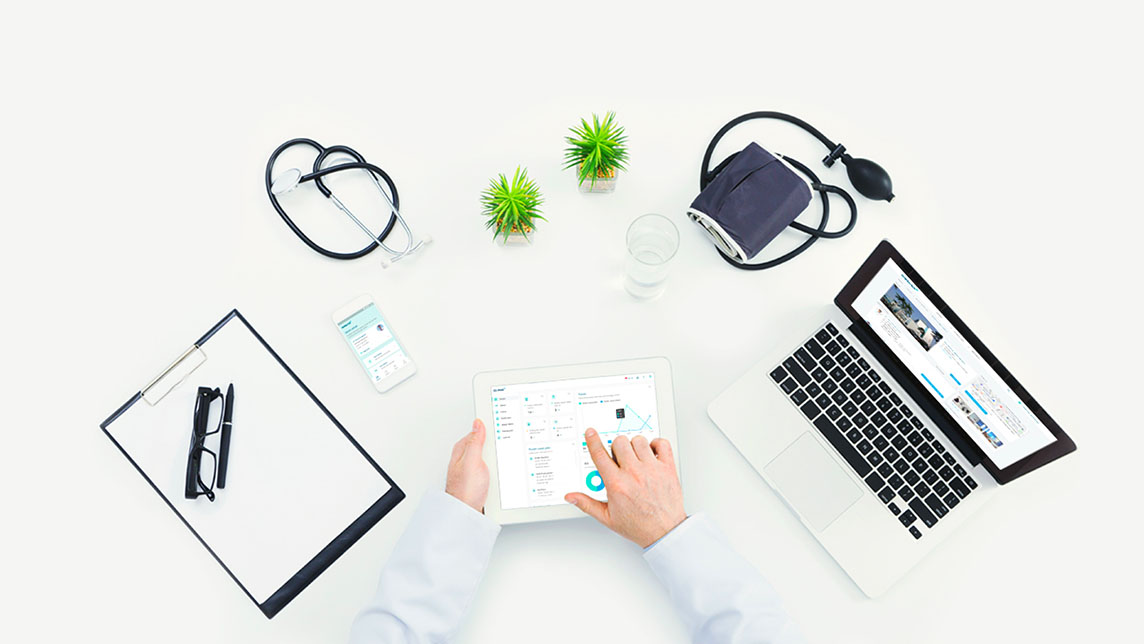While Indonesia is relaxing many restrictions and reopening its economy, testing for Covid-19 continues to take high priority as the spread shows no sign of easing. For example, travelers and workers in industries like F&B and hospitality are required to get tested. The government has also increased its daily testing target.
Indonesian healthcare startup Medigo is stepping up to support the drive for more testing. Air travelers and employees can get tested for the virus at Medigo’s 49 partner clinics. If they test negative, they are issued a health certificate, which they would need in order to board a plane or return to work. Medigo also partners national budget airline Citilink and online travel aggregator Traveloka to provide this service to travelers.
In an interview, Harya Bimo, CEO and founder of Medigo, detailed the new partnerships as part of Medigo’s pivot to building a network of smart clinics across Indonesia, starting with Klinik Pintar, the physical clinics it runs in partnership with the Indonesian Medical Association (IDI). The company, which helps hospitals and clinics digitize patients records and manage operations on the cloud, is preparing to raise a new round of funding to support the pivot, even as it has had to tighten its belt by spending less and laying off staff.
This interview has been edited for length and clarity.
How did the partnership between Medigo and Citilink begin?
Recently there has been an increase in the demand for Covid-19 tests, especially now that the government has decided to reopen businesses with some safety measures. We saw the massive need for testing, and the government needs help to increase the pace of Covid-19 testing with more affordable and accessible testing. There’s also a need for more test kits, but there’s the problem of substandard rapid test kits giving false results.
We had an idea to build a network of smart clinics that can provide standardized testing, and all of these clinics will be connected digitally; that was the prelude to our partnership with Citilink. We started with the pilots, air and ground crew, because they need a certificate of health to get back to work. Afterwards, we extended the service to Citilink passengers.
What do you mean by “connecting the clinics digitally”?
Before we started Klinik Pintar [Medigo’s self-run clinics], we managed to acquire some users in our SaaS-based platform, but converting them to paying customers was difficult. We thought that Indonesian clinics were not ready for a SaaS approach. We decided to build Klinik Pintar as part of our strategy, because the problem is not just tech, but how to implement that tech with proper policies and management of operations.
When Covid-19 hit, we had to adapt, just like any other startup or business. One of the things we had to do is finding ways to scale the network without actually building physical infrastructure. We decided to partner with conventional clinics that are already using our network by providing additional services. Now our users can provide rapid tests at their clinics, with us providing the test kits, the process, and the patient referrals. This helps clinics increase their revenue.
How do you direct patients to the clinics?
That comes from our partnership with Citilink. They need hubs in 24 cities across Indonesia to support their flight service. Passengers need to have at least a rapid test result certificate to fly. We are also partnering with Traveloka as a B2B2C channel, where patients can buy the voucher for testing at our 49 partner clinics.
How do you manage the logistics for this? For starters, how do you get the test kits?
We’ve been meeting a lot of suppliers, trying the different products, because a good test kit is important. We look for suppliers with standardization from the World Health Organization, the US Food and Drug Administration, and of course the Ministry of Health and the Indonesian Covid-19 task force, under the National Disaster Management Agency. Not many products have certifications from all four.
We’re very confident about standardizing our services using those kits. IDI also backs us, and they have a stake in it -- they need to make sure that the product we provide is one of the best in the market.
IDI has always been our partner in terms of providing best practices for standardization, including the rapid test. It’s not just the test kits, but the certifications of the medical workers, the tools and the protective equipment used, and the workflow, starting from managing queues in the clinic.
That sounds very hands-on. Do you have to send staff over to check?
We acquired the 47 partner clinics (the other two are Klinik Pintar locations in Bekasi) solely through online meetings. This network is built entirely during Covid-19, and I’m proud of the team for hustling and communicating with partners through online channels only.
But building that standardization and business practice is key for us, even before we rolled out. We had to use our reporting tools and know-how of running the clinics to provide this testing service. Klinik Pintar in Bekasi is regarded as one of the top clinics in terms of adapting to Covid-19, ensuring the safety of doctors and patients.
How did you adapt the services of Klinik Pintar?
We had to adopt telemedicine, integrating it with our existing offline business. We call it an “omni” approach. Since day one our approach has always been O2O. We see that some parts of the healthcare funnel can be done better online, from first interactions to gathering information.
But there are some things you can’t do online. Telemedicine is very limited in terms of providing valid diagnostics, especially for more serious illnesses.
So we need to build an effective O2O approach. What we managed to come up with is three approaches: full telemedicine; semi-telemedicine, where patients who come to our clinics can use electronic kiosks to interact with the doctors; and a regular physical meeting, with the doctors wearing full protective equipment.
This way, doctors can prioritize patients with more serious illnesses, meaning that they don’t have to wear the protective suit all day. That makes it more convenient for doctors and more secure for patients.
Klinik Pintar is one of the first clinics to get licensed for Covid-19 testing by the municipal government and the local health agency, thanks to our safety and security measures. Previously, only hospitals could do it. Now our clinics are the reference point for other clinics to do tests, and now you can go to any clinic in Bekasi and get Covid-19 testing.
How many people have been tested through these clinics?
We’re only in the third week of opening our clinics to Covid-19 testing, and we have reached more than 2,000 patients. [Editor: Medigo has updated the number to more than 13,000 patients tested as of July 6.] There’s a good mix between Citilink passengers and out-of-pocket patients. A lot of demand is coming from professionals and employees going back to work in the offices. They come from industries like F&B, hotels and hospitality-related businesses, who need to test their employees before they can get back to work.
How many hospitals and clinics are using your system?
The 47 clinics that are partnered with us are now our clients. The business model has also changed from a service provider-based operation to a more equal partnership, where we build a business together with our digital platform and services. With Klinik Pintar, we shifted from being a pure digital player to a partner that can provide technology, standardization and management, and increased opportunities for acquiring patients and earning revenue.
We have put our partnerships with hospitals on hold. Their priority right now is handling Covid-19, so a lot of our plans for monetization and even integration is still postponed until hospitals can refocus on digitizing their operations. We still have 13 hospitals under the Pertamedika using our service, a government hospital, as well as two other partner hospitals in the Bekasi area. For the latter two, the partnership is different because it’s linked to Klinik Pintar, which serves as general practice clinics, while patients who need specialist care can get referred to doctors to these partner hospitals.
The idea is to not just build a clinic network, but to add to that network with the capabilities of hospitals in each of our focus areas (Bekasi, Tangerang, Jakarta, and West Java).
So far, what are the biggest cost considerations that Medigo is facing, and how has it changed?
We have had to make adjustments to our costs in order to become a more sustainable business, focusing on building a lean team that contributes fully to our business KPIs. We’ve had to trim the fat in terms of salary and team size, and we have stopped hiring to focus on developing our existing teams. Costs related to maintaining the office have gone down, though, which helps quite a bit.
Another aspect is costs related to costs related to developing and maintaining our products. We had to focus on products that are needed by our main stakeholders. We decided to stop developing on the hospital side to focus on the clinic side now.
So Medigo has had to lay off personnel?
Yes, we had to lay off people two months ago, gradually forming a leaner team. I cannot disclose how many, out of respect for my team. We’re a small team still. We’ll miss the people who we had to let go and wish them the best, but we also helped them find new jobs in other companies.
Of course, the focus is to maintain the sustainability of the company right now. We’re getting a lot of traction in terms of Covid-19 testing and our new services, so we hope we can get the fuel to move forward with new opportunities.
Right now, how confident are you that Medigo is going to keep going strong for the rest of the year? What’s your runway like?
We managed to extend our runway and increase revenue thanks to pursuing the testing opportunities. We’ve been talking a lot to investors, but the process is slow and we have to prepare for the worst. However, the partnerships with Citilink and other partners have helped us build a new narrative. Initially we focused only on the physical Klinik Pintar, but that needs a lot of infrastructure development and physical interactions. Facing the challenges of Covid-19 has allowed us to see new ways to scale better post-Covid with our new three business models.
Can you tell me more about these business models?
Klinik Pintar provides a glimpse at how we are building this new business model. It’s a partnership with clinic owners, where we handle operations and share profit with them for five years. We only partner with clinics that are already accepting BPJS, because one of the biggest challenges we’ve seen right now is making sure that clinics that work to accept BPJS patients can stay sustainable.
Currently, we have three models in development: Prima, Virtua, and Paripurna. Virtua is for conventional clinics using Medigo’s SaaS platform, and they are in a revenue sharing business with us for a specific service. It’s designed to add revenue from a specific service. Right now it’s Covid-19 testing, but we can use it for vaccinations and other things, there’s a lot of opportunity. Klinik Paripurna is analogous to Klinik Pintar, the one we launched with IDI.
Finally, Prima is a hybrid model. It’s designed for independent doctors and specialists practicing in clinics who want to digitize their operations and adopt a more O2O approach. We use the platform and use a revenue-sharing scheme, expanding beyond the specific services but also to telemedicine, consultations, and dispensary. We invest in tools like digital kiosks, the tablet for the doctors and the cloud to enter and store medical information, as well as internet infrastructure where necessary.
We hope that we can start the ecosystem with Klinik Paripurna, expanding with Prima clinics to add specialist referrals, and Virtua will be the feeder clinics.
What are your plans for the rest of the year?
We’re aiming to acquire 100 clinic partners, and we’re starting on building Prima partnerships. We hope to have two to three Prima clinics in the next two to three months. We’re also planning to start building a new Klinik Pintar nearer to the end of the year. If everything goes well, we’re looking to reach 100 clinics by the end of this year.
Are you already in talks to raise new funding?
We’re already in close discussions with about five investors right now, and hopefully with all the limitations overcome, the process can happen much faster and we can close by the end of the year. We’re looking at Series A investment. Unfortunately we can’t disclose the amount, because that can provide a glimpse of the scale that we’re aiming for, and disclosing now wouldn’t be fair to the investors we’re talking to right now.














